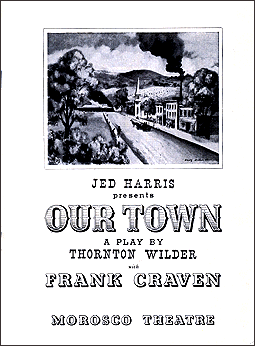
Playbill cover for Our Town in 1938.
It's 1938. In the United States, former two-term Senator and Governor of New York Franklin D. Roosevelt is serving his second term as President. Fair Labor Standards Act establishes a minimum wage for workers, set at 25 cents per hour. The price of a first class stamp is three cents. In Europe, the rising German Führer Adolf Hitler marches into Austria, declaring his long-desired Anschluss — the amalgamation of Austria with Germany. On Broadway, last season's Pulitzer Prize winner You Can't Take It With You by Moss Hart and George S. Kaufman still plays as does Clare Boothe's 40-woman cast of The Women. Adaptations of novels also flood the stage this season as Broadway productions of Madame Bovary and Of Mice and Men are based on the respective Gustave Flaubert and John Steinbeck novels. Earlier in the season, producer Jed Harris presented Henrik Ibsen's A Doll's House as adapted by Thornton Wilder at the Morosco Theatre.
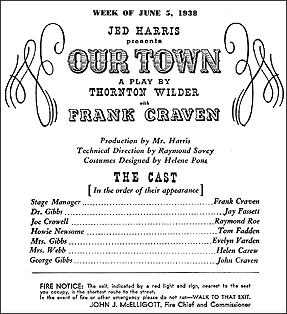
The title page in the Our Town Playbill.
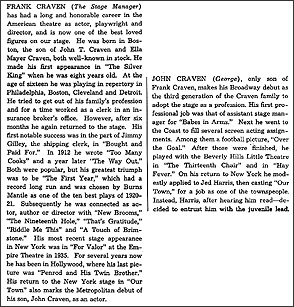
Craven vs. Craven: Frank and John's bios.
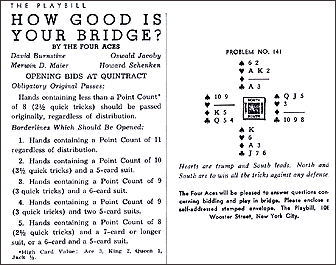
The Playbill "How Good is Your Bridge?" feature.
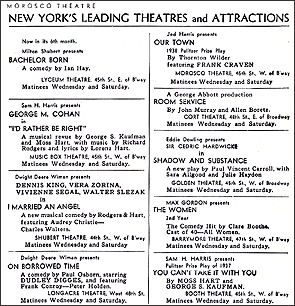
Shows also "On the boards" of Broadway in 1938.
Botto explained, "They were almost ready to close in Boston because it was not doing any business until Jed Harris was persuaded by [theatre critics] Alexander Woolcott and Brooks Atkinson. They both urged him to bring it into New York ahead of time and not close it out of town. So he brought it in to the Henry Miller Theatre and it opened. It only played there one week, but it got such brilliant reviews that he moved it to the Morosco Theatre and it won the Pulitzer Prize and it became a definite hit. The production was absolutely brilliant. I remember writing in my diary, 'This is the best play I've ever seen.'"
Our Town won the 1938 Pulitzer Prize for Drama, Broadway's top prize at the time — the Tony Awards would not be established for another nine years. Later in the original Broadway run, playwright Wilder will get to play his Stage Manager, a role taken on in subsequent Broadway revivals by such actors as Henry Fonda, Spalding Gray and Paul Newman — in the current production. Frank Craven will reprise his role for the 1940 film version opposite William Holden in the role originated by his son.









